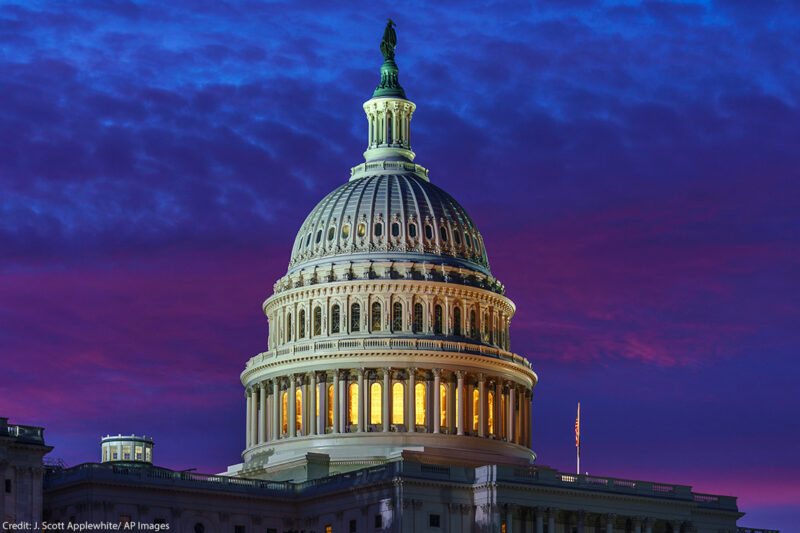One Year Later, Our Democracy is Still in Crisis


As we reflect on the first anniversary of the insurrection at the U.S. Capitol, it’s easy to think of that day’s attack as an isolated incident — a singular outlandish, violent siege that threatened our democracy. But beginning long before Jan. 6, there has been a sustained attack on our fundamental right to vote — the cornerstone of democracy. Devoid of the guns, knives, and bats wielded by the Jan. 6 insurrectionists, this threat may seem modest, but the future of our democracy is still very much in peril.
The ongoing threat has been waged by individuals pushing baseless conspiracy theories about widespread voter fraud. Among these adherents are politicians that use these unfounded claims as pretext for passing voter suppression laws and failing to improve access to the ballot. These efforts, or lack thereof, actively threaten the political power of targeted communities. The brazen white supremacy that fueled the insurrection was a stark reminder of the deeply-seeded racism and inequality that have flourished since our country’s founding, and many efforts to suppress the vote spring from the same source.
Washington, D.C., the site of the insurrection itself, is a persistent example of voter suppression happening today. The district is home to 700,000 residents, most of whom are Black and Brown, who are denied full voting representation in Congress. Without statehood and voting representation in the U.S. Senate and House of Representatives, Congress is able to create its own legislation for D.C. without any input from D.C. residents, and D.C. cannot pass its own laws without congressional approval. Like so many voting restrictions across the country, the district’s lack of statehood is — a stain on our democracy that must be rectified by Congress.
Make no mistake: Voter suppression efforts and unequal representation were widespread before the Jan. 6 insurrection — here at the ACLU, we’ve long fought to protect and expand this hard-won right. But last year’s violent refusal by a vocal minority to accept the peaceful transfer of power to a legitimately-elected president seemed to embolden rather than deter voter suppressors.
In 2021 alone, were introduced by states across the country, many of which will disproportionately burden voters of color. These measures run the gamut from restricting access to , eliminating , and making it more difficult to to to assist voters. Additionally, some states have racially gerrymandered new electoral maps that systematically disenfranchise Black voters.
On the heels of the U.S. Census Bureau’s data release in August 2021, states got to work redrawing district lines based on updated population data. The redistricting process happens every 10 years, and federal law dictates that lines be drawn to fairly reflect population changes and racial diversity. But too often, new maps are drawn for political gain — stifling the power and voices of certain communities. In late December, South Carolina and Georgia unveiled racially gerrymandered maps that were drawn and finalized in opaque processes that prevented community input and review. We’ve filed lawsuits challenging the maps of both states, which deny Black voters the opportunity to participate equally in our democracy.
These restrictions and barriers are bald-faced attempts by lawmakers and officials to limit who is part of the democratic process, how they get to participate, and when their participation counts. As Jan. 6 flagrantly illustrated, our democracy can’t be taken for granted — it must be protected and fortified, not just in our nation’s capital but in every state. While the ACLU will continue to litigate and push back against discriminatory and illegal voter suppression attempts, Congress must do its part by passing the John Lewis .
This legislation is needed to strengthen and restore protections from the Voting Rights Act that have been eroded over the past decade in two Supreme Court decisions. The court’s 2013 decision in Shelby County v. Holder, which struck down a key provision of the Voting Rights Act, removed necessary protections for people living in jurisdictions with a history of discriminatory voting practices and served as a catalyst for many states to immediately pass voter suppression laws. In 2021, the Supreme Court’s decision in Brnovich v. Democratic National Committee made it more difficult to challenge racial discrimination in voting. The VRAA’s passage will begin to mend the tremendous damage wrought by these decisions.
Suppressing access to the ballot and dismantling protections intended to safeguard the voting rights of marginalized groups threatens our democracy. Without leaders who have a vested interest in the communities most often stifled by voter suppression, legislation that springs from the states does not truly reflect or represent our communities, or our country. We must protect democracy from not only overt insurrection attempts, but also from more insidious schemes designed to subvert the electoral process through unfair and racially biased laws. In light of this threat, the ACLU has redoubled its efforts to fight for voting rights in courts, state legislatures, and on the streets — and we invite you to join us.

